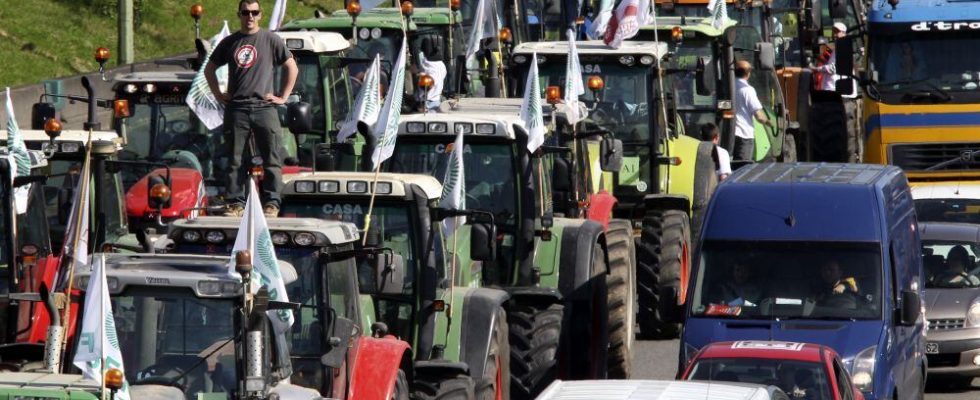Emmanuel Macron said no. This Tuesday, January 30, the President of the Republic expressed his opposition to the trade agreement between the European Union and Mercosur (Argentina, Brazil, Paraguay and Uruguay), because the rules of the South American bloc are not “homogeneous with ours”. At a time when the agricultural world is expressing its anger in France, the EU’s negotiations with the Latin American countries of Mercosur for a free trade agreement – supposed to facilitate European exports to South America, but also South American imports to the EU – are going badly.
The French president is due to meet Thursday with the President of the European Commission, Ursula von der Leyen, on the sidelines of a European summit. Because it is the Commission which received a mandate from EU member states to finalize this treaty. A political agreement was concluded in 2019, but opposition from several countries, including France – due, among other things, to its possible social and environmental consequences – blocked its final adoption. Today, the context of general mobilization of farmers in France does not seem to be conducive to its ratification.
The fear of unfair competition
Negotiations on this text began 25 years ago, in 1999, between the EU and the four founding countries of Mercosur. In fact, the trade agreement between the European Union and Mercosur aims to facilitate trade between the two blocs. It would be the largest free trade agreement concluded by the EU since it would concern nearly 780 million people and, in terms of trade volumes, would cover between 40 and 45 billion euros of imports and goods. exports.
Among the major concerns of the agricultural world regarding this treaty is the fact that the European market finds itself flooded with South American foods, overshadowing local agriculture. And for good reason: the draft agreement provides for the reduction of customs duties between the member countries of each of the two organizations (to 91% for the EU and 92% for Mercosur), or even their gradual elimination in certain cases. On agricultural products, Mercosur taxes on wine (27%), chocolate (20%), spirits (20 to 35%), canned peaches, soft drinks and even olives will be eliminated. In exchange, quotas must be established for Latin American countries allowing them to export each year, with little or no customs duties, 99,000 tonnes of beef, 100,000 tonnes of poultry or even 180,000 tonnes of sugar. .
As early as 2019, the president of the FNSEA Christiane Lambert was annoyed by “unfair competition”, pointing out that Mercosur products would be more competitive because they would not need to respect European standards (environment, animal welfare, etc.) for their production. Since then, the FNSEA has called for a “clear refusal of free trade agreements” and the Confédération paysanne calls for an “immediate end to negotiations” on this type of agreement.
“Discussions continue”
The conditions are “not met” to conclude the negotiations, acknowledged Tuesday Eric Mamer, spokesperson for the European Commission. Almost a week ago already, the head of European diplomacy, Josep Borrell, admitted that the crisis shaking the agricultural world in Europe could constitute an “obstacle” to the conclusion of a treaty. However, “discussions continue,” he added. “The European Union continues to pursue its objective of reaching an agreement which respects the EU’s objectives in terms of sustainability and which respects our sensitivities, particularly in the agricultural field,” he assured.
The next round of negotiations “depends on the analysis that we are going to do, and it is premature to announce the next date, if there is a new date, of the next negotiation,” the European Commission cautiously put forward. The issue of this free trade agreement is considered essential by several European countries, including Germany. And the German farmers’ protests have not changed this position, according to a European diplomat. Negotiations on the trade agreement between the EU and Mercosur “must be concluded quickly”, indicated the German Chancellor, Olaf Scholz, and the Argentine President, Javier Milei, during a telephone interview in early January. In the midst of farmers’ discontent, on Wednesday January 24, the Vice-President of the European Commission Vladis Dombrovskis said he hoped to conclude the agreement before the European elections in June.
In Germany, the EU-Mercosur agreement enjoys broad support, mainly from export-oriented industrial sectors, such as the automobile industry and mechanical engineering. Especially since the country is trying to diversify its markets abroad. Last December, German Chancellor Olaf Scholz lamented during a visit by the Brazilian president: “We have been discussing the free trade agreement between the EU and Mercosur for too long.”
